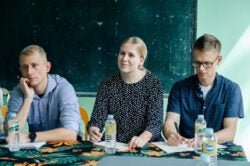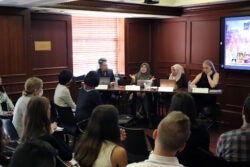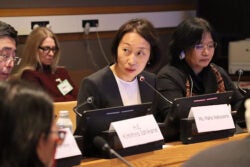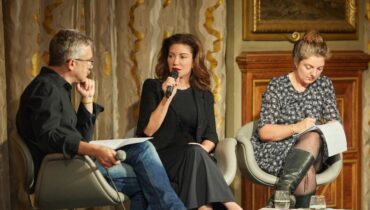The Georgetown Institute for Women, Peace, and Security (GIWPS) recently launched a report titled Beyond Engaging Men: Masculinities, (Non)Violence, and Peacebuilding. The report is the result of a three-year long international research collaboration between GIWPS, the Sasakawa Peace Foundation, and dedicated researchers and activists from conflict-affected regions in Indonesia and the Philippines. Delving into the intricate relationships between masculinities, (non)violence, and peacebuilding, the project marks an exciting new area of research for GIWPS and draws on insights from a survey conducted with six partner organizations in Aceh and Maluku in Indonesia, and the Bangsamoro Autonomous Region of Muslim Mindanao (the BARMM) in the Philippines.
The findings highlight the importance of mobilizing men for gender equality and efforts to make political processes and institutions—including peacebuilding and positions of public power—more inclusive.
Collaborating on Global Research
The findings in the report are based on the analysis of over 6,000 survey responses from men and women in Aceh, Maluku, and the BARMM. The survey asked questions about ideal qualities of masculinity, perceptions of men’s and women’s roles in public and private spaces, and gendered access to power. GIWPS collaborated closely with local partners to design the survey, including the International Center for Aceh and Indian Ocean Studies (ICAIOS); Intersectional Gender Research and Learning Asia (InteGRAL); Mindanao State University (MSU); PASKA Aceh; and Pattimura University in Ambon, Maluku. These local partners oversaw the data-collection process, with over 100 enumerators gathering survey responses. Researchers at ICAIOS, InteGRAL, and Mindanao State University, will publish additional reports in the coming months, further contextualizing and situating this data and bringing much needed depth and insights to the local dynamics driving the survey results.
Elevating Dialogue on Masculinities in Philippines & Indonesia
In December 2022, the GIWPS research team traveled to the BARMM to meet with local activists, researchers, and stakeholders. The trip, which was facilitated by Dr. Jovanie Camacho Espesor from MSU, was an opportunity for GIWPS researchers to meet with their counterparts at MSU and gain valuable insight into the context of the BARMM. The team attended a workshop with the Bangsamoro Women’s Commission, participated in a roundtable discussion with local government officials, representatives from UN Women, activists, and academics, and spoke with men and women about their experiences during the conflict. In bringing together international researchers, civil society, UN Women, and local government representatives, the events organized by Dr. Espesor underscored the importance of including men and masculinities in the Women, Peace and Security Agenda.

Joshua Allen, the 2022-2023 GIWPS Hillary Rodham Clinton Fellow, traveled onward from Mindanao to Aceh, Indonesia. Hosted by Dr. Eka Srimulyani and Cut Dewi from ICAIOS, he spoke with survey enumerators about the research and their own experiences of conflict, met with women’s rights and peacebuilding activists, as well as individuals who were part of the transitional justice process in Aceh. Allen was also able to attend focus groups with women’s activists and scholars sponsored by ICAIOS, and presented on the research project.
Bridging Theory & Practice in Washington, D.C.
In October 2023, research partners from Indonesia and the Philippines joined GIWPS in Washington DC for a high-level expert workshop and the launch of GIWPS’ report. GIWPS was also joined by representatives from the Sasakawa Peace Foundation: Ms. Maho Nakayama, Director and Senior Program Officer for the Peacebuilding Program, and Dr. Akiko Haribo, Senior Program Officer for the Peacebuilding Program, whose generous funding made this research possible. During the workshop, Ms. Rizki Affiat, co-founder and co-executive director of InteGRAL Knowledge, spoke about the impact of trauma on masculinities and violence, gendered divisions of household labor, and particularly emphasized the need for local ownership of gender equality efforts. Dr. Eka Srimulyani from ICAIOS, whose research focused on Aceh, spoke about the challenges resulting from focusing on elite men (and women) in the post-conflict reconstruction period, and emphasized the need for further research on intergenerational changes in gender norms.

Dr. Espesor from MSU, shared insights based on data from the BARMM and explained how conflict can be a breeding ground for ‘protective’ masculine norms to shift to violent masculine norms, and discussed how women in the BARMM navigated and leveraged patriarchy. The crucial insights shared by each of the speakers further situated the survey results, and highlighted the need for contextualized, locally owned research and program design, in the field of Women, Peace and Security and peacebuilding more broadly. Following presentations by GIWPS and local partners, participants from the State Department, USAID, National Democratic Institute, the Asia Foundation, and more engaged in a lively discussion about policy implications, and future areas of research.
High-level Launch Event at the United Nations
The launch event at the United Nations in New York City, which featured Japanese Minister for Foreign Affairs H.E. Yoko Kamikawa, the US Ambassador to the UN T.H. Linda Thomas-Greenfield, and the Japanese Ambassador to the UN H.E. Kimihiro Ishikane, focused on the importance of engaging men in Women, Peace and Security efforts.
“We really need men as allies. Women should not always have to be the ones calling out gender imbalances.”
T.H. Linda Thomas-Greenfield

Ms. Nakayama introduced the project and outlined how the report was the result of a years-long, transnational collaboration between global and local stakeholders. Lead author Dr. Robert Nagel (GIWPS) spoke in detail about the findings and policy implications of the report. Dr. Gary Barker, founder and CEO of Equimundo, spoke about the necessity of engaging men not only as allies in achieving gender equality for the sake of women, but also the importance of helping men understand that they too are harmed by patriarchal norms and have a personal stake in gender equality. Ms. Samsidar, the Chair of the Board of Trustees of the Indonesian Justice and Peace Foundation, provided key insights from Aceh, Indonesia and emphasized the importance of ground-up approaches to peacebuilding and women, peace and security work. She also spoke about her own activism in Aceh and her work championing women’s inclusion in all aspects of peacebuilding and governance, including in the lead up to the Security Council’s adoption of Resolution 1325 in 2000.
“We need to facilitate more dialogue, connecting local and international stakeholders, to explore the question of how we can advance the WPS agenda and gender equality.”
Ms. Maho Nakayama, Director and Senior Program Officer, Peacebuilding Program, Sasakawa Peace Foundation

